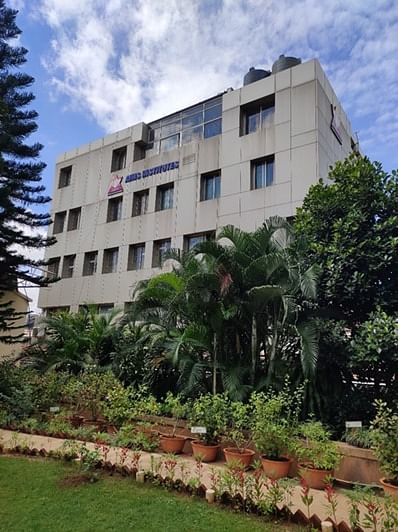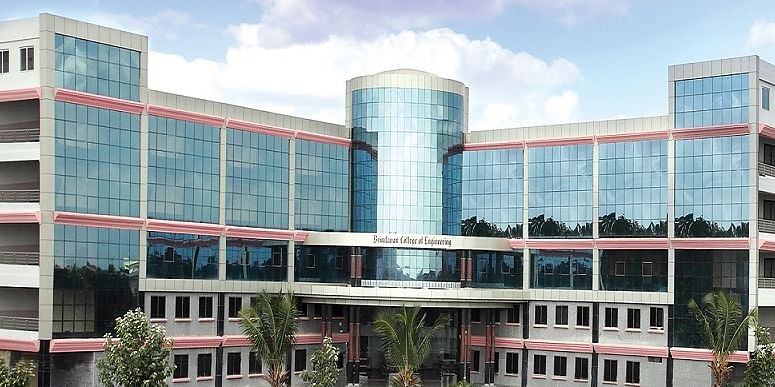BBA Aviation Syllabus and Subjects

The BBA Aviation syllabus is divided into six semesters consisting of both core and elective subjects. The core subjects in BBA Aviation focus on topics such as Fundamentals of Management, Final Accounts, Accounts of Non-Trading Concerns, Airports and their Services, Air Safety and Security, etc.
In the BBA Aviation syllabus, students have the option to select elective subjects according to their interests and career goals. These may include Computer Application and Information Technology, Business Entrepreneurship and Management, Corporate Social Responsibility, and more.
BBA Aviation subjects mainly focus on topics such as Business Accounting, Cost and Management Accounts, Aircraft Maintenance, Cabin Crew Management, Cost Accounting, Aviation Security, etc. The BBA in Aviation course teaches students about managing, finance, leadership, and marketing in aviation. It uses different teaching methods to ensure a thorough understanding.
Table of Contents
Semester-Wise BBA Aviation Syllabus
BBA Aviation syllabus is designed to enrich the students with knowledge and understanding about the concepts of business management, resource management, aircraft maintenance, safety regulations, etc to make them industry-ready.
Listed below is the semester-wise BBA Aviation Syllabus:
BBA Aviation 1st Year Syllabus
The BBA Aviation 1st sem syllabus focuses on topics such as Emerging Issues in Management, Royalty Accounts, Number Systems, Airline Alliances, etc. Listed below is BBA Aviation first-semester and second-semester syllabus:
|
Semester-I |
Semester-II |
|
Fundamentals of Management |
Organizational Behavior |
|
Accounting and Management Decisions |
Strategic Human Resource Management |
|
Quantitative Techniques of Management - I |
Aviation Security and Safety Management |
|
Introduction to Airline Industry |
Quantitative Techniques of Management - II |
BBA Aviation 2nd-Year Syllabus
The BBA Aviation second-year syllabus covers topics such as Marketing and Retail Management, Logistics and Air Cargo Management, Aviation Law, Aircraft Rules and Regulations, etc.
Listed below is the second-year BBA Aviation syllabus:
|
Semester-III |
Semester-IV |
|
Production and Operations Management |
Business Research Methods |
|
Marketing and Retail Management |
Financial Management |
|
E-Business Information System |
Business Regulations |
|
Cost and Management Accounting |
Travel and Tourism Management |
|
Aviation Law Aircraft Rules and Regulations |
Logistics and Air Cargo Management |
BBA Aviation 3rd-Year Syllabus
The BBA third-year syllabus enriches the students with an understanding of topics such as Aircraft Maintenance Management, Investment Analysis and Management, Airport Strategic Planning, etc. Given below is the BBA Aviation third-year syllabus:
|
Semester-V |
Semester-VI |
|
Goods and Services Tax |
Entrepreneurship Development |
|
Income Tax-I |
Income Tax-II |
|
Investment Analysis and Management |
Marketing Management |
|
Aircraft Maintenance Management |
Strategic and Performance Management |
|
Cabin Crew Management |
Airport Strategic Planning |
|
Finance and Insurance in Aviation |
Principles of Airline and Airport Management |
BBA Aviation Subjects
The BBA in Aviation subjects is divided into core and elective subjects focusing on the foundation and fundamentals of business management, organizational behaviour, accounting, and finance to equip students with the required knowledge about aviation management.
Below is a list of year-wise core & elective subjects in the BBA Aviation syllabus:
BBA Aviation First-Year Subjects
The BBA Aviation 1st year subjects focus on core subjects such as accounting and management decisions, quantitative techniques for management, Introduction to the Airline Industry, etc, and elective subjects such as Corporate Governance, Entrepreneurship, etc.
Listed below are the core and elective BBA Aviation subjects and the topics covered for the first year:
|
Subject |
Topics Covered |
Type of Subject |
|
Accounting and Management Decisions |
Final Accounts, Hire Purchase Systems, Royalty Accounts, Specialist Decision Making Techniques |
Core |
|
Quantitative Technique for Management |
Matrices and Determinants, Statistics and Measure of Central Tendency, Index Numbers |
Core |
|
Introduction to the Airline Industry |
Airline Profitability, Organizational Structure and Airline Alliances, Airport and its Services |
Core |
|
Strategic Human Resource Management |
Acquiring Human Resources, Developing Human Resources, Labour Management |
Core |
|
Aviation Security and Safety Management |
Importance of Air Transportation Safety, Terrorism, Hijacking, Legislations and Regulations |
Core |
|
Fundamentals of Management |
Introduction to Management, Planning, Emerging Issues in Management, Planning and Organising |
Core |
|
Corporate Governance |
Corporate Governance and Role of Committees in India, Business Ethics, Corporate Social Responsibility |
Elective |
BBA Aviation Second-Year Subjects
BBA Aviation 2nd year subjects cover topics such as marketing and retail management, aviation law, aircraft rules and regulations, etc. Listed below is the BBA Aviation second-year subject list:
|
Subject |
Topics Covered |
Type of Subject |
|
Production and Operation Management |
Plant Location and Layout, Material Management, Production Planning and Quality Control |
Core |
|
Marketing and Retail Management |
Product Development and Pricing Decisions, Retail Management, Strategic Planning, Global Retail Market |
Core |
|
E-Business Information System |
Types of Information Systems, Database Management Systems, Accounting Software and GST |
Core |
|
Cost and Management Accounting |
Output or Unit Costing, Joint products and by-products, Management Control Systems |
Core |
|
Aviation Law and Aircraft Rules and Regulations |
Civil Aviation Regulations, Aircraft Rules, Aircraft Legislation, Civil Aviation Requirements |
Core |
|
Business Research Methods |
Methods of Data Collection, Statistical Methods, Report Writing, Tools for Data Collection |
Core |
|
Financial Management |
Time Value of Money, Capital Structure and Financial Decisions, Investment Decisions and Dividend Decisions |
Core |
|
Business Regulations |
Law of Contract, Legality of Objects, Creation of Agency, Negotiable Instruments Act |
Core |
|
Logistics and Air Cargo Management |
Concepts of Logistics, Transport System Model and Warehouse Regulations, Air Cargo Concept |
Core |
|
Entrepreneurship Development |
Characteristics of successful Entrepreneur, Financing of small business in India, NBFC-meaning and schemes, Venture Capital |
Elective |
BBA Aviation Third-Year Subjects
The BBA Aviation 3rd year subjects focus on topics such as Goods and Services, Income Tax, Investment, Budget Management, etc. Listed below is the BBA Aviation 3rd-year subject list:
|
Subject |
Topics Covered |
Type of Subject |
|
Goods and Services Tax |
GST Act, SGST Act, Procedure and Levy under GST, Assessments and Returns |
Core |
|
Income Tax-I & II |
Exempted Income, Residential Status, Income from Salary, Income from House Property |
Core |
|
Investment Analysis and Management |
Securities Analysis, Portfolio Management, Mutual Funds, |
Core |
|
Aircraft Maintenance Management |
Types of Maintenance, Production Planning and Control, Maintenance Control Center, Quality Control |
Core |
|
Cabin Crew Resource Management |
CRM History, Human Error and Error Management, CRM Skills and Requirements |
Core |
|
Finance and Insurance in Aviation |
Airline Finance, Aircraft Leasing, Principles of Insurance and Risk Management |
Core |
|
Entrepreneurship and Development Program |
Small-scale industry formation, Preparing the business plan, project assistance, Financial Assistance |
Core |
|
Marketing and Services Management |
Air Travel Marketing, Airline Revenue Management, Airport Marketing, Evolution of Traditional Airport |
Core |
|
Strategic and Performance Management |
Strategic Management, Environmental Appraisals, Planning and Implementation |
Core |
|
Airline Marketing Management |
Airline Market And Performance, Product Analysis In Airline Marketing, Market Research |
Elective |
|
Airport Safety And Security Management |
Physical Security for the Aviation Environment, Airport Aircraft Emergencies, Airport Emergencies Response and Noise Control |
Elective |
|
Corporate Social Responsibility |
International Framework For Corporate Social Responsibility, CSR-Legislation In India, Voluntarism Judicial Activism |
Elective |
BBA Aviation Course Structure
The BBA Aviation subjects are taught through traditional theory sessions, internships, presentations, projects and dissertations. The following is the BBA Aviation course structure:
- VI Semesters
- Core and Elective Subjects
- Internship
- Project Submission
- Dissertation
BBA Aviation Teaching Methodology and Techniques
The BBA Aviation syllabus employs various teaching methods. It includes action-based learning like presentations, projects, dissertations, etc., where students can apply their learnings. Such teaching methods help engrain theoretical knowledge and develop soft skills.
Following are the teaching processes followed in the BBA Aviation course syllabus:
- Lectures
- Discussion
- Case Study
- Simulation
- Industrial Visit
- Presentation
BBA Aviation Projects
BBA Projects enhance the students' thinking and broaden their horizons. Projects enable students to visualize the concept and better understand what they learn in theory. Following are the popular BBA Aviation projects:
- A Study on the Impact Of Airline Route Development On Airport Costs
- A Cost-Benefit Analysis of Commercial Airlines
- Perception of People Towards Air Transportation and Aircraft Systems
- Effects of Airport Safety and Security Issues
- A Study to Investigate Ways of Reducing Casualties in a Plane Crash
- Pilot Fatigue: Impacts on Safety and Issues
- The Impact of Unbundling on Scheduled Airlines
- The Ethical Concerns in the Airline Industry
BBA Aviation Books
BBA Aviation books help the students explore beyond the BBA Aviation syllabus and understand the concepts clearly. The year-wise BBA Aviation books followed by colleges across India are detailed in the sections below.
First-Year BBA Aviation Books
Some of the common first-year BBA Aviation books suggested by most universities are Elements of Cost Accounting, Business Laws, Management Accounting, etc. Given below are the BBA Aviation 1st year books and the topics covered:
|
Books |
Topics Covered |
Author |
|
Elements of Cost Accounting |
Objectives of Inventory Control, Accounting of Material Loss, Method of Pricing of Material Issues |
Maheshwari Mittal |
|
Fundamentals of Financial Accounting |
Accounting Fundamentals and Principles, Accounting For a Merchandising Enterprise, Accounting Cycle |
D.K. Goel, Rajesh Goel, Shelly Goel |
|
Business Laws |
Nature and Kinds of Contracts, Offer and Acceptance, Legality of Object and Consideration |
L.C. Mittal |
|
Management Accounting |
Characteristics of Managerial Accounting, Cost Terminology, Computerized Accounting System, Approaches to Allocating Overhead Costs |
S.N. Mittal |
|
Principles of Management |
Personality, Attitudes, and Work Behaviors, Developing Mission, History, Globalization, and Values-Based Leadership |
R.K. Singla |
Second-Year BBA Aviation Books
The BBA Aviation 2nd year books used by most institutions are Cost Accounting- S P Jain, Airport Operations – Norman J Ashford, Management Accounting –Saxena, etc. Given below are some of the common BBA Aviation books:
|
Books |
Topics Covered |
Author |
|
Management Accounting |
Process Costing, Service Costing, Joint product and by-product |
Saxena |
|
Marketing Management |
Management and marketing roles, Recruiting and Developing the team |
William J Stanton |
|
The Airport Business |
Evolving Airline Industry, Future of Airline Industry, Dynamic Strategic Planning, Multi Airport Systems |
Dogains R |
|
Financial Accounting |
Accounting Principles, Trial Balance, Account Current, Rectification of Errors |
B S Raman |
|
Airport Operations |
Airport Peak and Airline Scheduling, Ground Handling, Baggage Handling, Airport Security |
Norman J Ashford |
Third-Year BBA Aviation Books
Listed below are the BBA Aviation 3rd year books along with the topics covered and author details:
|
Books |
Topics Covered |
Author |
|
Project Planning: Analysis, Implementation and Review |
Strategy and Resource Allocation, Generation and Screening of Projects |
Chandra P |
|
Project Management |
Project Formulation, Feasibility Analysis, Economic Value Addition Analysis |
Desai V |
|
Direct Taxation |
Taxation of Trusts, Computation of Total Income, Aggregation of Income and Set Off or Carry Forward of Loss |
T N Manoharan |
|
Income Tax Law and Accounts |
Income from Salary, Income from House Property, Capital Gains |
H.C. Mehrotra |
Top BBA Aviation Colleges
Top Aviation Entrance Exams
BBA Aviation Fee Structure
FAQs on BBA Aviation Syllabus and Subjects
Q: How many subjects are there in BBA Aviation?
Q: Does BBA Aviation have math?
Q: Is BBA Aviation tough?
Q: Can I study aviation without math?
Q: What are the passing marks for BBA aviation?
Q: What are the assessment criteria for the BBA Aviation syllabus?
Q: What are the technological-specific skills that I can expect to develop during the program?
Q: Are there opportunities for hands-on experience with aviation technology, simulators, or other industry equipment?
Q: What topics are covered in airline management?
Q: What are the fundamental principles of aircraft operations covered in the BBA Aviation syllabus?























